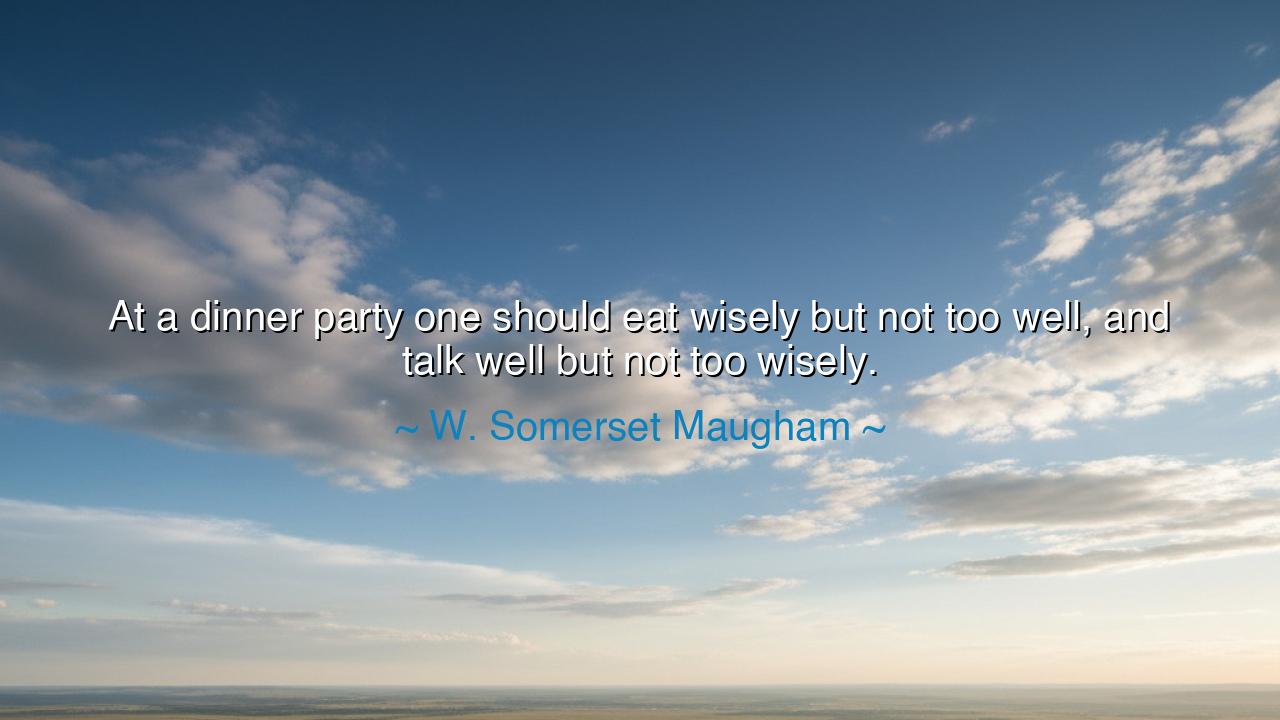
At a dinner party one should eat wisely but not too well, and
At a dinner party one should eat wisely but not too well, and talk well but not too wisely.






W. Somerset Maugham, with the wit of a sage who understood both the banquet table and the theater of society, once said: “At a dinner party one should eat wisely but not too well, and talk well but not too wisely.” In this paradox lies the art of balance, the delicate weaving of pleasure and restraint, wisdom and charm. It is not merely advice on dining—it is a meditation on the social dance, where moderation and measure turn a gathering into harmony rather than discord.
The meaning of this reflection reveals itself in two parts. To eat wisely but not too well is to partake with dignity, to enjoy nourishment without surrendering to gluttony. At a table, eating too well may betray greed or ostentation, while eating wisely shows respect for the host, the food, and the occasion. Likewise, to talk well but not too wisely is to converse with eloquence but without overbearing seriousness. Too much wisdom may weigh down the table, suffocating laughter with solemnity. But words that are light, graceful, and thoughtful bring warmth and ease. Thus, the table becomes not only a place for the body’s feeding but also for the soul’s delight.
The origin of this insight is rooted in the long history of banquets as stages of civilization. From the Greeks to the Romans, the symposium and convivium were not only meals but theaters of intellect and society. Plato wrote dialogues framed by shared cups of wine; yet even there, the philosophers knew that wit and moderation were necessary companions to wisdom. A guest who drank too deeply or spoke too heavily was no longer a delight, but a burden. Maugham’s words echo this ancient truth: society flourishes where balance rules.
Consider the tale of Voltaire, that fiery mind of the Enlightenment, who was a master of dinner-table charm. He understood that to dazzle without exhausting, to sprinkle wit without drowning others in intellectual torrents, was the secret of winning hearts as well as minds. By contrast, many a learned scholar, unable to restrain his wisdom, found himself shunned, for his words turned the joy of the meal into a sermon. Thus we see that wisdom, like salt, must be used sparingly—too little and the dish is bland, too much and it is ruined.
The deeper wisdom of this quote is not about dining alone—it is about life itself. To eat wisely but not too well is to live with moderation, enjoying the fruits of the world without being enslaved by them. To talk well but not too wisely is to live with humility, sharing insights that uplift others rather than overwhelm them. It is a call to harmony: the body nourished, the mind enlivened, the spirit refreshed through community and balance.
The lesson for us is clear: in your gatherings, seek the middle path. Do not aim to impress with excess, whether in food or in wisdom, but to bring comfort and delight. Let your words sparkle, but not sting. Let your plate be satisfied, but not burdened. For the true success of a dinner—or of any meeting—lies not in how much was consumed or declared, but in how much joy and connection was shared among those present.
Practical wisdom follows: when next you find yourself at a table, be mindful of your part in the symphony. Eat with grace, drink with temperance, speak with charm, listen with care. Remember that the measure of a gathering is not in the dishes or the doctrines, but in the fellowship it creates. A table is sacred when it becomes the stage for laughter, memory, and unity.
So, children of tomorrow, heed Maugham’s teaching: the art of living is the art of balance. Do not gorge yourself on food or pride, do not weigh down the air with the burden of too much wisdom. Instead, shine with lightness, nourish with measure, and let the table be not only a place of feeding, but of flourishing. For where food is shared wisely and words spoken well, there the spirit of humanity glows most brightly.






AAdministratorAdministrator
Welcome, honored guests. Please leave a comment, we will respond soon